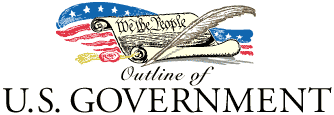
| Ch 1 | Ch 2 | Ch 3 | Ch 4 | Ch 5 | Ch 6 | Ch 7 | Ch 8 | APP |OVERSIGHT POWERS OF CONGRESS
| |
|
Dictionaries define "oversight" as "watchful care," and this approach has proven to be one of the most effective techniques that Congress has adopted to influence the executive branch. Congressional oversight prevents waste and fraud; protects civil liberties and individual rights; ensures executive compliance with the law; gathers information for making laws and educating the public; and evaluates executive performance. It applies to cabinet departments, executive agencies, regulatory commissions, and the presidency.
Congress's oversight function takes many forms: The oversight power of Congress has helped to force officials out of office, change policies, and provide new statutory controls over the executive. In 1949, for example, probes by special Senate investigating subcommittees revealed corruption among high officials in the Truman administration. This resulted in the reorganization of certain agencies and the formation of a special White House commission to study corruption in the government. The Senate Foreign Relations Committee's televised hearings in the late 1960s helped to mobilize opposition to the Vietnam War. Congress's 1973 Watergate investigation exposed White House officials who illegally used their positions for political advantage, and the House Judiciary Committee's impeachment proceedings against President Richard Nixon the following year ended his presidency. Select committee inquiries in 1975 and 1976 identified serious abuses by intelligence agencies and initiated new legislation to control certain intelligence activities. In 1983, congressional inquiry into a proposal to consolidate border inspection operations of the U.S. Customs Service and the U.S. Immigration and Naturalization Service raised questions about the executive's authority to make such a change without new legislation. In 1987, oversight efforts disclosed statutory violations in the executive branch's secret arms sales to Iran and the diversion of arms profits to anti-government forces in Nicaragua, known as the contras. Congressional findings resulted in proposed legislation to prevent similar occurrences. Investigation by a bipartisan congressional commission and subsequent Senate hearings in 1996 and 1997 uncovered instances of abuse and mismanagement in the Internal Revenue Service (IRS), the federal agency responsible for collecting income tax payments. The Senate Finance Committee heard testimony from IRS agents who claimed that the pressure on them to recover unpaid taxes was so great that taxpayers were sometimes harassed and from citizens who said they were wrongly accused and aggressively pursued by the IRS for failure to pay taxes. In 1998, the Congress passed IRS reform legislation that created an independent oversight board and expanded taxpayers' protections, which included shifting the burden of proof in tax disputes from the taxpayer to the IRS. Time and again, the oversight power of Congress has proven to be an essential check in monitoring the presidency and controlling public policy.
|
|
RETURN TO
|